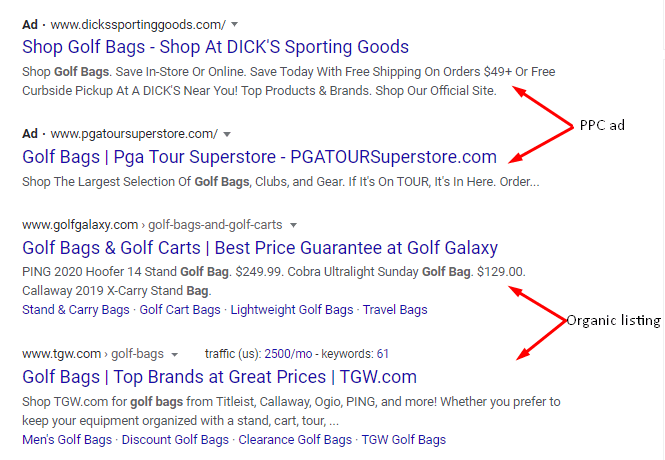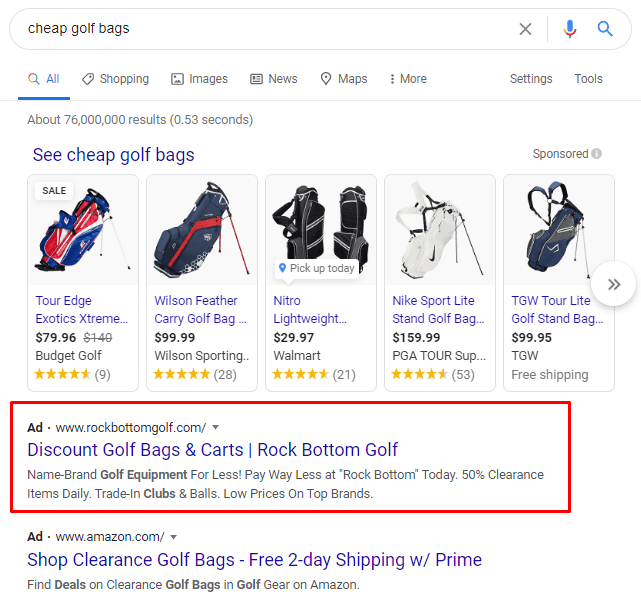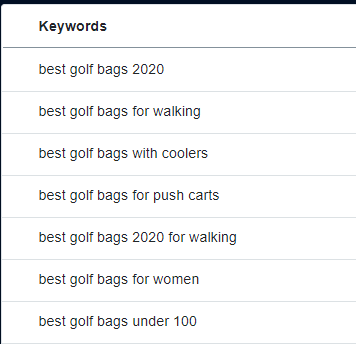-
 12 min. read
12 min. read
-
 Macy Storm
Macy Storm Senior Content Creator
Senior Content Creator
- Macy is a marketing writer with over five years of experience creating content for dozens of industries including food and beverage, home services, and education. She also specializes in creating SEO and PPC content. Her work has been featured by Search Engine Journal, HubSpot, Entrepreneur, Clutch, and more. In her free time, Macy enjoys trying new crafts and reading comic books.
Did you know that four times as many people are likely to click on a paid ad on Google than any other search engine? If you aren’t running pay-per-click (PPC) ads on Google, you’re missing an excellent opportunity to drive more clicks, leads, and conversions for your business. But what is PPC advertising?
And how does PPC work on Google? Learn the answers to those questions in this post and get four tips on how to get your ads to rank better!
P.S. If you want to get the latest tips and tricks in marketing, join 200,000 marketers by subscribing to Revenue Weekly!
What is PPC?
Before we answer the question, “how does Google paid search work?” let’s first define PPC. PPC is a form of paid advertisement where companies can publicize their products at the top of the Google search results — above the organic listings.
These ads put companies in a position where searchers will see them at the top of a results page. 
How does PPC work on Google?
Now it’s time for the most critical question: How does PPC work on Google? Here’s a brief overview of the steps we’ll cover:
- Someone searches on Google
- Google looks at the advertiser pool
- The auction triggers if there are enough advertisers
- Google looks at multiple components of the ad to determine relevancy
- Google analyzes your maximum bid and Quality Score
- Google determines your ad rank
- Your ad appears in its appropriate rank for the searcher
Let’s break down these steps so you can get an idea of how Google paid search works:
1. Someone searches on Google
The process begins with someone conducting a search query on Google. Whether or not your ad appears in search results for that query depends on your keyword selection. Your ad won’t appear unless some searches using your designated keywords.
2. Google looks at the advertiser pool
Once someone searches, Google looks at the advertiser pool to see who’s bidding on that keyword for an ad. This step occurs so Google can determine if there are enough ads to trigger an auction. If only one advertiser bids for the keyword, there is no need for an auction.
There are numerous cases where an auction might not happen. A prime example is running an ad for your business’s name. Like in this example from Golf Galaxy, you can see that their ad is the only one that appears in the search results.
 It’s highly unlikely that any other companies will bid for that keyword because the searcher is looking for a specific business, rather than looking for a more open-ended query like “cheap golf bags.” As a result, Google doesn’t need to launch an auction because of only one business bidding on the keyword.
It’s highly unlikely that any other companies will bid for that keyword because the searcher is looking for a specific business, rather than looking for a more open-ended query like “cheap golf bags.” As a result, Google doesn’t need to launch an auction because of only one business bidding on the keyword.
3. An auction gets triggered if there are enough advertisers
If there’s more than one advertiser, Google will hold an auction to determine ad placement. This auction happens in milliseconds. When a user conducts a search query that generates an ad auction, they don’t even know it’s happening.
Google holds an auction to ensure that the most relevant ads get delivered to the user. It takes the company’s bid amount, as well as their quality score, into account when choosing your ad’s position. We’ll dive into these two components more later.
4. Google looks at keyword selection for the ad
To determine your ranking, Google looks at the keyword selection for your ad. You can bid on multiple keywords, but Google will look for keywords most relevant to the search query. So, take this example from Rock Bottom Golf.
When conducting the search query “cheap golf bags,” their ad appears first in the search results.  While they may have optimized for the keyword “cheap golf bags,” you can also see they targeted the keyword “discount golf bags.” While it doesn’t match the exact query, the keyword is still relevant to the search “cheap golf bags.” So, having relevant keywords is something Google considers when determining relevancy.
While they may have optimized for the keyword “cheap golf bags,” you can also see they targeted the keyword “discount golf bags.” While it doesn’t match the exact query, the keyword is still relevant to the search “cheap golf bags.” So, having relevant keywords is something Google considers when determining relevancy.
5. Google analyzes your maximum bid and quality score
When you get answers to the query “How does Google paid search work?” you hear a lot about your maximum bid and Quality Score, as well as the critical role these two elements play in determining your ad ranking. So, what are your maximum bid and Quality Score?
Maximum bid Your maximum bid is the most you’re willing to pay when someone clicks on your ad. This amount is flexible and you can change it as needed.
Generally, you’ll want to research and see what the average bid amount is for that keyword. Then, based on that information, you can determine where to set your maximum bid. When you set your maximum bid, you’ll never pay more than the amount you’ve designated.
This system helps you keep control over your budget.
Quality Score The other factor Google considers is your Quality Score. Your Quality Score is Google’s rating on the relevancy and value of your PPC ad. Quality Score is calculated on a scale of 1 to 10. You want to get a score as close to 10 as possible because it will help you earn higher ranking ad positions. Numerous factors make up your Quality Score, including:
- Clickthrough rate (CTR)
- Keyword relevancy
- Landing page relevancy
- Landing page quality
- Ad text relevancy
Essentially, you need to create an ad that’s entirely relevant for the search query and provides users with the necessary information if you want to have a high Quality Score.
6. Google determines your ad rank
After analyzing your keyword selection, bid amount, and Quality Score, Google determines where your ad appears in search results. Your ad rank is calculated with the following formula:
CPC bid x Quality Score = Ad rank
When it comes to determining your ad rank, it’s better to have a higher quality score than a higher maximum bid. Google wants to deliver relevant ads that generate clicks so that it will pick a high-quality ad with a low bid amount over a low-quality ad with a high bid amount.
If you have a higher quality score, it will lead to a high ad rank score. As a result, your ad is more likely to rank at the top of search rather than the bottom. Here’s an example of what that looks like with four advertisers competing for the same keyword:
| Advertiser | Maximum Bid | Quality Score | Ad Rank |
|---|---|---|---|
| Company A | $4.00 | 6 | 24 |
| Company B | $7.00 | 1 | 7 |
| Company C | $3.00 | 10 | 30 |
| Company D | $5.00 | 2 | 10 |
So, as you can see, Company C has the best ad rank score, even though they don’t have the highest bid.
They will still get the top spot even though Company B had the highest bid because Company C’s ad is more relevant to the search query.
7. Your ad appears in the search query
Once the page loads, your ad will appear in its appropriate rank in the search query. Now, the user that searched that query could see your business’s ad and can click on it to learn more.
How to get a better ranking for your Google PPC ad
Now that you have an answer to “How does PPC work on Google,” it’s time to move on to how to do PPC on Google. How can you optimize your PPC ads to get better rankings?
Here are six tips for creating better PPC ads.
1. Set goals for your PPC ads
Before you start worrying about quality score or budgets, you need to set goals for your PPC ads. You won’t be able to build a relevant and high-quality ad without knowing what you want to achieve first. Think about your PPC ad campaign.
What’s the goal of running this ad? You can choose from many PPC goals, such as:
- Increasing brand awareness
- Increasing leads
- Increasing sign-ups
- Increasing conversions
- And more!
When you know your goals, you can create a more effective ad that’s relevant and keeps you focused on achieving your goal.
2. Focus on choosing the right keywords
Once you know your goals for your PPC ad, you can focus on choosing the right keywords for your PPC ad. Keywords trigger your ad to appear in search results and help determine if your ad content is relevant to the user’s search query. Knowing how to do PPC on Google starts by choosing the right keywords.
You can find relevant keywords for your ad by conducting keyword research. Use a keyword research tool, like KeywordsFX, to see related terms for your ad.  It’s important to note that you’ll want to focus on long-tail keywords for your ad.
It’s important to note that you’ll want to focus on long-tail keywords for your ad.
Long-tail keywords have less competition, so the bid amounts are lower. Additionally, you attract more qualified leads because they’re conducting a specific search query. By finding relevant, long-tail keywords, you’ll create more opportunities for your ads to rank higher in search queries.
3. Make sure you have a high-quality landing page
If you want to know how to do PPC on Google, take a moment to analyze your PPC landing page design. Your landing page is a critical component for getting your ads to rank higher. When we answered the question, “how does Google paid search work,” you saw that your ad’s landing page plays a role in determining your rank. Google wants to deliver advertisements that have relevant landing pages because it provides a more positive user experience.
As you create your landing page, make sure it’s relevant to your ad content. So, if you’re running an ad for cheap golf bags, you want to ensure that your landing page is relevant to your ad text. So, for example, with this ad from Amazon, you’d expect a landing page that showcases their cheap or discounted golf bags.
 When you click on the Amazon ad, you’re directed straight to a page with cheap golf bags. This landing page is what the user expects to find when searching for “cheap golf bags.” It delivers what the user wants to see and provides them with a positive experience. So, when you’re creating your landing pages, you want to keep your audience in mind.
When you click on the Amazon ad, you’re directed straight to a page with cheap golf bags. This landing page is what the user expects to find when searching for “cheap golf bags.” It delivers what the user wants to see and provides them with a positive experience. So, when you’re creating your landing pages, you want to keep your audience in mind.
Think about the information they want to see on your landing page and what they’ll find helpful and relevant. You’ll also want to consider the presentation of your landing page. Not only do you need a landing page that has relevant information, but it should also be visually appealing.
When you design your landing page, you’ll want to choose:
- Your landing page colors (can be your business’s colors to build brand familiarity)
- Your font style (no more than two)
- Your photo or video style
All these elements impact your audience’s experience on your landing page. So, you’ll want to put a lot of thought and consideration into your choices to ensure you’re delivering the best experience. Bonus tip: Test your landing pages!
Using A/B testing can help you see how much better your landing page performs by making small changes. It can help you improve a user’s experience, and ultimately, enable your page to rank better.
4. Build up your Quality Score
When we covered the question, “how does PPC work on Google,” you found that Quality Score plays a significant role in determining your ad’s rank in search results. If you find that an ad you’re running doesn’t have the best Quality Score, you can take steps to improve your score. So, to recap, your Quality Score is determined by factors like:
- Clickthrough rate (CTR)
- Keyword relevancy
- Landing page relevancy
- Landing page quality
- Ad text relevancy
Look at your ad and see if there is anywhere you can improve in these areas. You can ask yourself questions like:
- Am I targeting the right keywords?
- Are there better keywords I could target?
- Does my landing page content match my ad content?
- Am I missing important information on my landing page?
- Do I have too much information on my landing page?
- Is it easy to look at and read the information on my landing page?
- Is my ad text relevant to the keyword?
- Is there room to improve my ad text?
Asking these questions can help you identify problem areas and improve your Quality Score to gain a higher ad ranking.
93% of WebFX customers are extremely satisfied with their digital marketing results.
“Working with WebFX, everything is very organized and strategic. We’re only a year into our partnership, and our expectations have definitely been met.”
View More Client Testimonials

Start creating conversion-worthy PPC ads today
Now that we answered, “how does PPC work on Google,” and we provided you with tips on how to do PPC on Google, you’re ready to launch your campaign. PPC is an excellent strategy if you’re looking to expand your reach and drive more qualified leads for your business. But if you aren’t sure how to make an impactful, results-driven PPC ad, WebFX is here to help.
We’ve managed over 650 PPC campaigns and know how to create PPC ads that drive results. With our team of over 500 experts, you can feel confident that we’ll deliver a PPC campaign that helps you grow your business. Want to learn more about launching a PPC campaign and why its worth it? Contact us online or call us today at 888-601-5359 to speak with a strategist about our PPC services!
-
 Macy is a marketing writer with over five years of experience creating content for dozens of industries including food and beverage, home services, and education. She also specializes in creating SEO and PPC content. Her work has been featured by Search Engine Journal, HubSpot, Entrepreneur, Clutch, and more. In her free time, Macy enjoys trying new crafts and reading comic books.
Macy is a marketing writer with over five years of experience creating content for dozens of industries including food and beverage, home services, and education. She also specializes in creating SEO and PPC content. Her work has been featured by Search Engine Journal, HubSpot, Entrepreneur, Clutch, and more. In her free time, Macy enjoys trying new crafts and reading comic books. -

WebFX is a full-service marketing agency with 1,100+ client reviews and a 4.9-star rating on Clutch! Find out how our expert team and revenue-accelerating tech can drive results for you! Learn more
Try our free Marketing Calculator
Craft a tailored online marketing strategy! Utilize our free Internet marketing calculator for a custom plan based on your location, reach, timeframe, and budget.
Plan Your Marketing Budget

Maximize Your Marketing ROI
Claim your free eBook packed with proven strategies to boost your marketing efforts.
Get the GuideTry our free Marketing Calculator
Craft a tailored online marketing strategy! Utilize our free Internet marketing calculator for a custom plan based on your location, reach, timeframe, and budget.
Plan Your Marketing Budget




